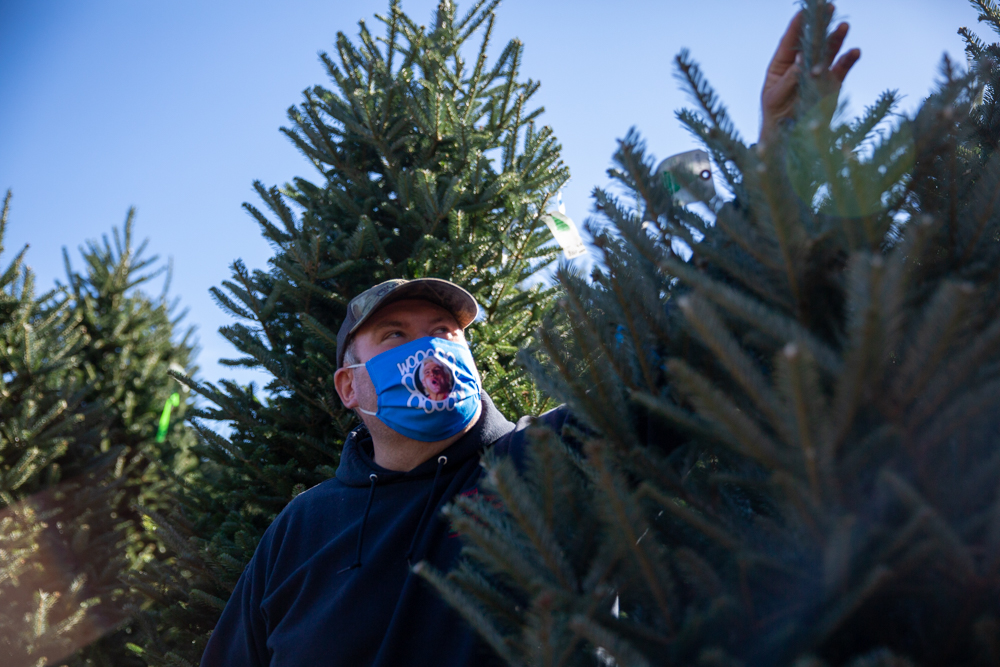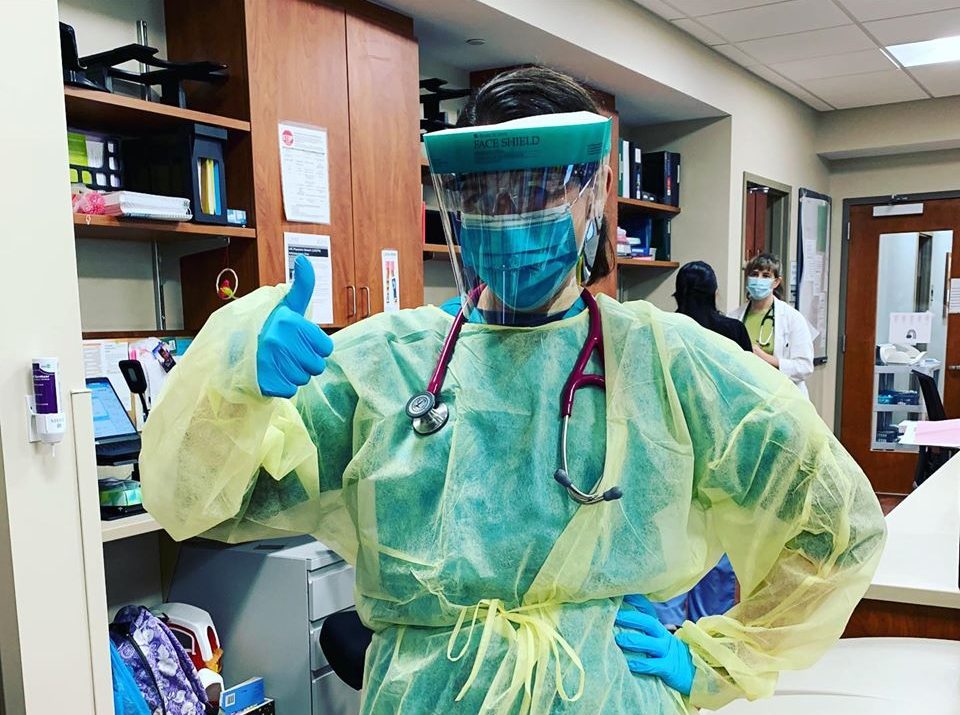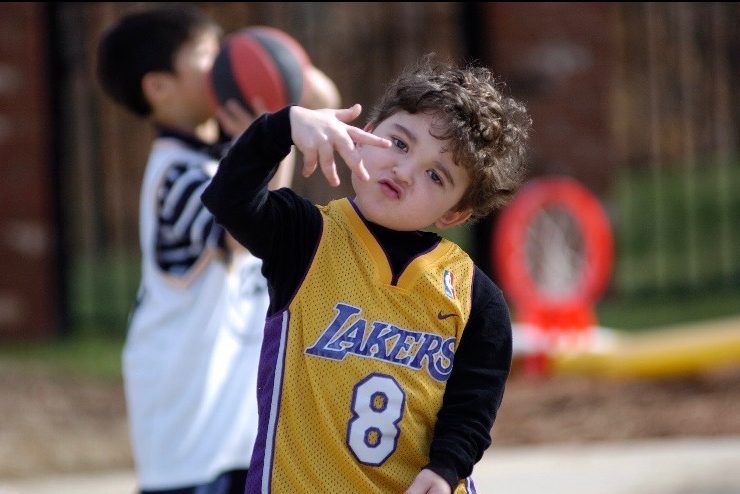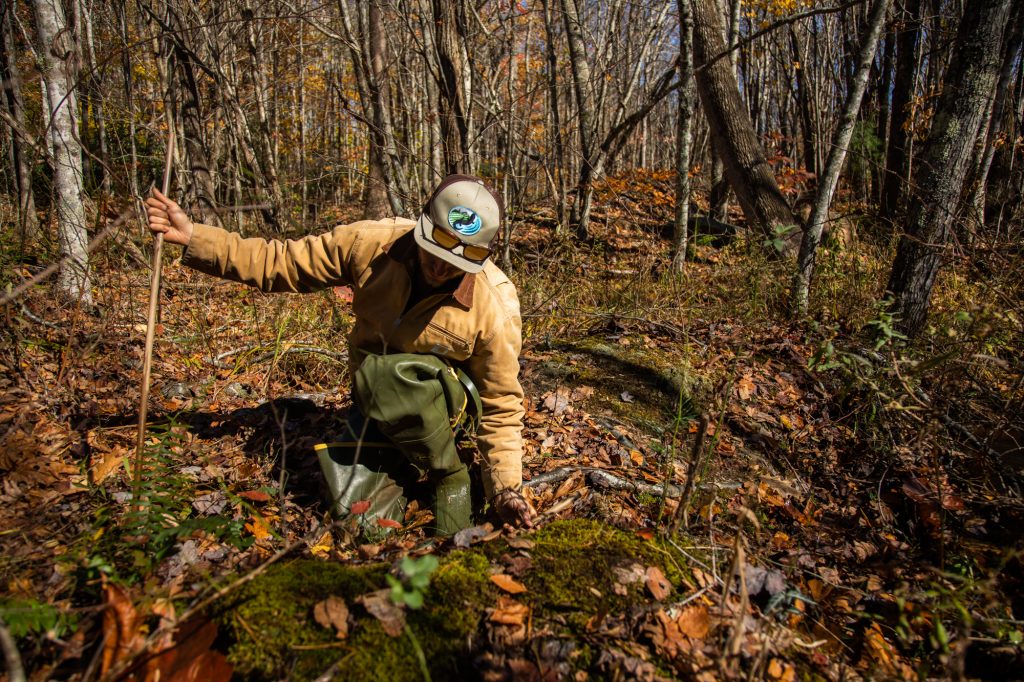
Story by: Molly Weisner
Photos by: Elizabeth Ranatza
via UNC Media Hub
Weekends were always for Larry.
Michelle Goyeau, 52, spent the week working full-time as a public health social worker in the mountains of North Carolina. At home, she helped her 17-year-old son with college applications and online school.
But on Saturday, March 14, Goyeau jumped in the car – as she often did on weekends – to visit her husband.
Larry is 64 years old and in a memory care facility in Asheville. He has early onset Alzheimer’s disease, which began for him around the age Michelle is now.
When Goyeau walked into her husband’s facility, she was told it would be the last time she could see him because of coronavirus restrictions.
“None of us really knew where this was going,” she said.
So, she set up FaceTime visits with Larry and played the familiar Bob Dylan tracks on his iPod to make up for the screen between them.
March emptied into April, which blurred into May and dragged on to June. Michelle’s virtual visits “seemed OK,” until she was told Larry was behaving differently.
By August, he was crying and yelling, seeming more frustrated than he had been months before. She scheduled a FaceTime visit to see him.
For families like Goyeau’s, time is not on their side. As long-term care facilities approach seven months of lockdown, families are noticing major declines in the physical and mental health of their loved ones who have been quarantined inside.
“It was such a dramatic difference,” Goyeau said.
She paused, taking labored breaths, and began retelling the day she saw her husband through an unfeeling video screen.
When he was wheeled into the frame, Larry was slumped over in his chair, sedated.
This was the man who loved being active outdoors, paddling or riding his bike. He was most comfortable in jeans, a fleece jacket and his hiking boots. The only time Larry ever wore a tie was at a wedding or funeral, Goyeau said.
But when she saw him over FaceTime, he was disheveled and listless. Wanting to see him in-person, Michelle then scheduled a window visit at his facility, the first since March.
She noticed, almost blithely and in the way only a wife could, that he needed a haircut. But she couldn’t reach out and take care of him.
“I don’t know if he’s giving up,” Goyeau said, her voice faltering. “I’m not there, you know? And I – don’t know what he’s feeling.”
The N.C. Department of Health and Human Services announced Monday that indoor visits are permitted in certain long-term care facilities with no recent outbreaks. But for Goyeau and others, this update comes too late for family members who have declined since March.
Alzheimer’s disease, the most common form of dementia, is a progressive and irreversible neurological condition. As it advances, toxic changes in the brain create an environment where brain cells cannot communicate with each other. A few weeks’ time may not make a significant difference in the progression of Alzheimer’s disease, but months can.
Larry smiled when she spoke to him, but Michelle realized in the months that had passed since March, time and isolation made her husband worse.
“There’s all these stories of people dying alone,” Goyeau said. “This is not how their stories should end.”
For nearly a decade since her husband’s diagnosis, Goyeau has been coordinating care for her him and taking over the financial and household responsibilities. Larry has been living away from his wife and son for several years, first in an assisted living facility and now in a memory care center.
Since the pandemic began, Goyeau spent hours a day monitoring the state’s coronavirus updates, hoping an announcement or exception would allow her to see her husband. Now that indoor visits are permitted, she’s following up with her husband’s facility to see how quickly they’ll begin.
“I’m really sad that we’ve missed so much time together,” Goyeau said.
As North Carolina attempts to control one public health crisis, families of Alzheimer’s and dementia patients say another arises in the form of extended periods of isolation from friends and family.
Linda Hyatt Pope’s mother is 81 years old and has Lewy body dementia, a form of dementia that causes paranoia and delusions in some patients. Margaret Gowan has both. She has been living in a nursing home in Huntersville since before the pandemic. Pope was able to visit her mother and calm her when she had episodes.
“Now, here we are, fast forward with COVID-19, that stopped everything,” Pope said.
Gowan, who relies on lip-reading because of her poor hearing, is often unable to connect with her daughter through window visits or calls.
One day, Pope tried to visit her mother through double-paned glass. Gowan didn’t understand why she couldn’t come inside and pleaded through tears at the window.
“Why can’t you come in? Just put this mask on. You can come in.”
“It tears your heart into a million pieces,” Pope said.
Like Goyeau, Pope says there’s not just an emotional imperative, but an urgency to being able to visit family in nursing homes. Since the pandemic, Pope said her mother progressed to the next stage of her dementia, and her episodes have become more frequent and more intense.
“I know that this disease is going to kill her” Pope said. “It’s hard to wait for the next phase, 2.5, 2.75 or [if] there’s going to be another outbreak.”
Dr. Claire Larson works in geriatric medicine in Chapel Hill. She says symptoms of anxiety, depression and loneliness have been more prevalent in elderly patients since the pandemic began.
But families and patients know why visits are limited. They know threat of coronavirus in nursing homes is tremendous – 40% of all COVID-19 deaths in the U.S. are linked to nursing homes, according to The New York Times.
The N.C. Department of Health and Human Services and Gov. Roy Cooper work together to set guidelines for nursing homes, which are also shaped by recommendations made by the Centers for Medicare & Medicaid Services.
Kelly Haight Connor, communications manager for the Department of Health and Human Services, said most nursing homes are regulated by the federal government through the Centers for Medicare & Medicaid Services. CMS is a part of the federal Department of Health and Human Services.
Minnesota, Florida and Texas already updated nursing home recommendations to include essential caregivers on approved visitor lists. These recognized visitors, often a family member or friend, are deemed essential to a patient’s daily care or emotional wellbeing and allowed to visit indoors.
“All we’re asking is to have the same rights that nurses have,” Pope said. “We understand if they need to set a limit on where and how long [visits] can be.”
Goyeau, Pope and others are trying to get North Carolina to adopt its own essential caregiver designation.
CMS does not distinguish between essential caregivers and other visitors, according to its Sept. 17 statement. But CMS also issued guidance on permitting indoor visits in certain circumstances, acknowledging that “physical separation from family and other loved ones has taken a physical and emotional toll on residents.”
Until in-person visits trickle down to their facilities, all Pope and Goyeau have is whatever outdoor visits and phone calls they can schedule.
Pope says with the holidays coming up, it’s even more important to be able to see her mother, who she says has never spent a holiday without her family.
Goyeau had her first outdoor visit with her husband on Sept 17. She said the 6-foot table between them had a tablecloth on it with an autumn-themed centerpiece – a sweet, but wistful attempt at normalcy.
“I was giddy with the thought of being able to see him,” Goyeau said. “Like, oh my God, am I in high school or something?”
But the fact that she was masked brought back the chill of reality. Her voice was muffled, and it obscured her familiar face. Larry was more alert than he had been in recent FaceTime calls, she said, but he was still not responding much to voice, despite being as close as she’d been in half a year.
“It was a little more pleasant than I thought,” she said. “But it was really hard not to break the rules and give him a big hug and hold his hand.”
When she left, she realized outdoor visits – which many applauded – were still no replacement. Even indoor visits won’t make up for time lost, she said.
“I don’t know if he knows who I am at this point,” Goyeau said.
But Michelle knows who Larry is. She knows it took chatting with him by the vending machine at their work several times before they were dating for him to realize she was flirting.
She knows he played a mixtape of songs from their wedding when she was in labor.
She knows he loves being a dad to their only child, Zach, and changed more diapers than even she did.
What she doesn’t know is when he’ll be home, or when she can see him in person. She doesn’t know if they can celebrate Thanksgiving or Christmas together. There’s a collection of ornaments the family bought as Zach grew up, and Michelle doesn’t know if Larry will be there to decorate the tree.
“Missing that time with someone who doesn’t have a lot of time left is just cruel,” she said.
 Stories from the UNC Media Hub are written by senior students from various concentrations in the Hussman School of Journalism and Media working together to find, produce and market unique stories — all designed to capture multiple angles and perspectives from across North Carolina.
Stories from the UNC Media Hub are written by senior students from various concentrations in the Hussman School of Journalism and Media working together to find, produce and market unique stories — all designed to capture multiple angles and perspectives from across North Carolina.














